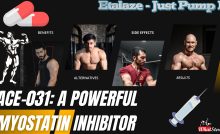Costly Cycling Mistakes You Ought to Stop Immediately


Professional bodybuilders are highly dedicated and experienced individuals. However, they can still make mistakes in their training and cycling (periodic use of performance-enhancing drugs) that may hinder their progress or risk their health. Here are some common cycling mistakes that pro bodybuilders may make:
Overreliance on Steroids
Pro bodybuilders sometimes rely too heavily on steroids to achieve their physique goals. This can lead to health issues and the risk of dependence on these substances.
Excessive Dosages
Using higher doses of steroids than necessary can increase the risk of side effects and health problems. Some may think that more is always better, but this is not the case with steroids.
Must Read: First Injectable Steroid Cycle
Inadequate Post-Cycle Therapy (PCT)
Neglecting to implement a proper post-cycle therapy can lead to hormonal imbalances, muscle loss, and other complications after coming off a steroid cycle.
Too Frequent Cycling
Some pro bodybuilders may cycle steroids too frequently, preventing their natural hormone production from fully recovering. This can lead to long-term health issues.
Neglecting Health Monitoring
Professional bodybuilders should regularly monitor their health through blood tests, physical exams, and other assessments. Ignoring these check-ups can lead to undetected health problems.
Inadequate Rest and Recovery
Pro bodybuilders often push their bodies to the limit, which can lead to overtraining and injuries. Proper rest and recovery are essential for long-term success.
Poor Nutrition
Neglecting a balanced and well-structured diet can hinder progress and overall health. Nutrition is a critical component of bodybuilding success.
Ignoring Mental Health
The pressure and demands of professional bodybuilding can affect mental health. Ignoring mental well-being can lead to burnout and other issues.
Neglecting Mobility and Flexibility
Focusing solely on muscle size and strength can lead to limited mobility and flexibility. Maintaining a full range of motion is essential for overall health and performance.
Not Adapting to Changing Needs
As the body changes over time, pro bodybuilders may need to adjust their training, nutrition, and cycling protocols. Failing to adapt can lead to stagnation.
Prioritizing Aesthetics Over Health
Pro bodybuilders may prioritize their competition aesthetics over their long-term health, which can lead to health problems down the line.
Lack of Off-Season
Some pro bodybuilders fail to give their bodies a sufficient off-season period, essential for recovery and addressing health concerns.
Risky Substances
In the quest for an edge, some professional bodybuilders may experiment with unproven or potentially dangerous substances, risking their health.
Why Cycling Too Often Is A Bad Idea
While cycling can be a valuable strategy for making progress and avoiding plateaus, cycling too often or without proper planning can have several potential dangers and drawbacks in bodybuilding:
Overtraining
Constantly changing workout routines or training intensities without adequate recovery can lead to overtraining, resulting in decreased performance, fatigue, and an increased risk of injuries.
Inconsistent Progress
Frequent cycling can make tracking progress difficult, which can be demotivating. Consistency is often key to making substantial gains in muscle mass and strength.
Lack of Mastery
Frequent changes in training routines may prevent you from mastering specific exercises or techniques essential for muscle hypertrophy and strength development.
Nutritional Imbalance
Cycling macronutrient ratios or specific diets too often can lead to nutritional imbalances and may not give your body the consistency it needs to adapt and grow.
Supplement Ineffectiveness
Over-cycling supplements can make your body desensitized to their effects. Some supplements work best when cycled, but doing so too often may hinder their efficacy.
Mental Fatigue
Constantly switching between training styles or diets can lead to mental burnout, requiring frequent adaptation and decision-making.
Time-Consuming
Designing and implementing new routines, diets, or supplement regimens can be time-consuming. This time might be better spent focusing on consistent, long-term strategies.
Risk of Injury
Frequent changes in exercises or training modalities can increase the risk of injury, as your body may not adapt fully to the movements before changing them again.
Difficulty in Identifying What Works
If you change elements too frequently, it can be challenging to determine what training, nutrition, or supplement strategies are genuinely effective for your body.
Potential for Frustration
Constant changes can lead to frustration and impatience as you may not see the immediate desired results. Building muscle and strength often requires patience and consistency.
- Unrealistic Expectations: Frequent cycling can foster unrealistic expectations for fast and constant progress. Muscle growth and strength gains often occur in phases and require consistent effort.
- Financial Costs: Constantly changing supplements or diets can be financially burdensome. Supplements, in particular, can be expensive when used excessively.
In bodybuilding, the key is to balance incorporating variety and ensuring consistency. Properly planned cycles with adequate rest and recovery periods can be beneficial. Still, overdoing it by cycling too often can hinder your long-term progress and increase the risk of injury or burnout. It's essential to have a well-structured training and nutrition plan that aligns with your goals and allows you to make steady, sustainable progress over time.
Overcoming Mental Fatigue Caused By Unregulated Cycling
Overcoming mental fatigue due to excessive cycling in bodybuilding is essential for maintaining motivation, consistency, and long-term progress. Here are some strategies to help you combat mental fatigue and stay on track:
Set Clear Goals
Clear, well-defined goals can give you a sense of purpose and direction. When you know what you're working toward, it can be easier to stay motivated and focused.
Create a Structured Plan
Develop a well-structured training and nutrition plan that aligns with your long-term goals. A clear plan can reduce the need for constant changes and experimentation.
Periodization
Use periodization techniques to plan your training cycles. Periods of intensity and rest can help you maintain progress without constant changes.
Progress Tracking
Keep a detailed log of your workouts, diet, and supplement intake. This allows you to see your progress and identify what works best for you, reducing the need for constant changes.
Manage Expectations
Understand that muscle growth and strength gains take time. Set realistic expectations and accept that progress may come in phases rather than steadily.
Focus on Fundamentals
Instead of constantly seeking novelty in your workouts or diets, focus on mastering the fundamentals. Improving your form, technique, and consistency can lead to better results.
Consult a Coach or Trainer
If you're overwhelmed by the complexity of your program, consider working with a knowledgeable coach or trainer who can provide guidance and structure.
Seek Social Support
Connect with fellow bodybuilders in person or through online communities to share experiences, advice, and motivation. Supportive peers can help combat mental fatigue.
Implement Rest and Recovery
Ensure you build rest days into your training plan and deload weeks or months. This helps prevent physical and mental burnout.
Relaxation Techniques
Incorporate relaxation techniques like meditation, deep breathing, or yoga into your routine to manage stress and mental fatigue.
Variety Within Consistency
While excessive cycling can lead to mental fatigue, some variety in your workouts can be refreshing. You can change exercise variations or rep schemes periodically without a complete overhaul.
Psychological Breaks
Take occasional breaks from intense bodybuilding routines to give your mind a rest. Engage in hobbies or activities unrelated to your training to recharge mentally.
Education
Continuously educate yourself about effective training and nutrition strategies. The more you know, the more you can make informed decisions about your regimen.
Reevaluate Your Priorities
Sometimes, taking a step back is essential to assess whether your bodybuilding goals align with your current lifestyle and priorities.
Professional Help
If mental fatigue becomes overwhelming or is accompanied by symptoms of anxiety or depression, consider seeking the support of a mental health professional.
Remember that bodybuilding is a long-term endeavor, and consistency and patience are key to success. Reducing the frequency of cycling and finding a balanced, sustainable approach can help you overcome mental fatigue and continue progressing in your bodybuilding journey.
Related Article: Olympic Lifting: 25 Strategies That Work
Handling Poor Steroid Cycling Like A Pro
Steroid cycling has immense benefits and health risks in equal measure. It all depends on a person's approach. Here is how you can ensure steroid cycling doesn't backfire on you.
Consultation with a Healthcare Professional
The process begins with a consultation with a qualified healthcare provider. This could be an endocrinologist, sports medicine specialist, or healthcare professional. You must have a legitimate medical reason for using steroids, such as hormone deficiencies or certain medical conditions.
Medical Evaluation
Your healthcare provider will conduct a thorough medical evaluation, including blood tests, to determine your needs and the appropriate dosage.
Prescription
If it's determined that you need anabolic steroids, your healthcare provider will prescribe the specific type and dosage based on your medical condition and requirements.
Monitoring
Regular monitoring, including blood tests, is crucial to assess the effects of the steroids on your body and adjust the treatment plan as needed.
Cycling and Dosage
Under medical supervision, a specific cycling plan will be established, including the duration of steroid use and the dosage. It's essential to follow the prescribed protocol strictly.
Post-Cycle Therapy (PCT)
A post-cycle therapy plan may help your body recover its natural hormone production after completing a steroid cycle. This step is critical in minimizing potential side effects.
Adverse Effects Management
If you experience any adverse effects during the treatment, you should promptly communicate with your healthcare provider, who can adjust your treatment plan accordingly.
Supplementation Blunders
Supplementation, when used responsibly and under the guidance of a healthcare professional for legitimate medical purposes, can be beneficial when using steroids. However, there are some poor supplementation habits that individuals should avoid when using steroids, especially for non-medical or performance-enhancement purposes. These habits can lead to health risks and other complications:
Over-Reliance on Steroids
One of the common mistakes is relying excessively on steroids to achieve muscle gains, neglecting other essential aspects of training and nutrition. Steroids should complement, not replace, proper diet and exercise.
Excessive Dosages
Taking higher doses of steroids than recommended or necessary can increase the risk of side effects and health issues. Following the prescribed dosage is crucial for safety.
Neglecting Other Supplements
Some individuals may focus solely on anabolic steroids and neglect supplements that can support overall health and well-being, such as vitamins, minerals, and essential nutrients.
Ignoring Post-Cycle Therapy (PCT)
Neglecting to undergo proper post-cycle therapy after using steroids can lead to hormonal imbalances, muscle loss, and other complications. PCT is essential to help your body recover its natural hormone production.
Inadequate Monitoring
Failing to regularly monitor your health through blood tests, physical exams, and other assessments can lead to undetected health problems or side effects.
Combining Multiple Compounds
Some individuals make the mistake of combining multiple types of steroids and other performance-enhancing substances, which can increase steroid use's complexity and potential risks.
Neglecting Health Warnings
Many steroids carry health warnings and potential side effects. Ignoring these warnings and not seeking medical advice if you experience adverse effects can be dangerous.
Poor Nutrition
Relying on supplements while neglecting a balanced and well-structured diet can hinder progress and overall health. Nutrition is a critical component of bodybuilding success.
Misuse of Over-the-counter Supplements
Combining anabolic steroids with over-the-counter supplements can be risky, especially with stimulants or other compounds that may interact negatively.
Relying on Supplements for Quick Fixes
Some people may expect supplements to provide rapid results without putting in the effort required through proper diet and training. This is an unrealistic expectation and can lead to disappointment.
Neglecting Overall Health
Focusing solely on muscle gain and performance can lead to neglect of overall health, including cardiovascular and organ health. Regular check-ups are important.
Lack of Education
Before using supplements, educate yourself about their effects, potential risks, and legal implications. Being well-informed can help you make safer decisions.
It's important to remember that using anabolic steroids should only occur under the guidance and supervision of a qualified healthcare professional for legitimate medical purposes. Misusing steroids or supplements can have serious health consequences and legal ramifications. Always prioritize your health and well-being and consider alternatives to achieve your fitness and bodybuilding goals that don't involve using performance-enhancing substances.
Overall Benefits Of Cycling
Cycling is important for several reasons:
Preventing Plateaus
The human body is highly adaptable. Over time, it can become accustomed to a specific training routine or diet, leading to plateaus in muscle growth and strength gains. Cycling helps break through these plateaus by introducing new stimuli.
Muscle Confusion
Changing exercises, rep ranges and training techniques keeps your muscles guessing, leading to more well-rounded development. This approach is often referred to as "muscle confusion."
Preventing Overtraining
Cycling can prevent overtraining, where the body is pushed beyond its capacity to recover. Your body can recover fully by periodically reducing training intensity or taking de-load weeks.
Mental Refreshment
Cycling can provide a mental break from the monotony of a consistent routine. It can help keep you motivated and engaged in your training.
Injury Prevention
Repeating the same exercises and movements continuously can increase the risk of overuse injuries. Cycling allows for variety and reduces the risk of such injuries.
Adaptation to Individual Needs
Your body's needs change over time. Cycling allows you to adapt to these changing needs, such as periods of higher or lower training intensity based on your goals, energy levels, and recovery.
Optimizing Hormonal Balance
Cycling can help maintain a healthier hormonal balance by preventing the overuse of high-intensity training or extreme dieting, which can negatively affect hormone levels.
Long-Term Sustainability
Cycling is an integral part of a sustainable and balanced approach to bodybuilding. It helps you avoid burnout and injury, enabling you to train and build muscle over the long term.
Customization
It allows you to customize your training and nutrition plan to specific goals. For instance, you might focus on strength and shift to hypertrophy or endurance.
Recovery
Deload periods or less intense training phases during cycles give your body time to recover, reducing the risk of injury and chronic fatigue.
Evaluating Progress
Cycling can help you assess the effectiveness of different training techniques or dietary strategies over time, making it easier to identify what works best.
Avoiding Burnout
Cycling in bodybuilding can help prevent mental and physical burnout, keeping your passion for training alive.
Overall
It's important to note that while cycling is valuable, it must be done thoughtfully and within a structured plan. Frequent and haphazard changes can lead to inefficiency and confusion. Proper periodization, under the guidance of a knowledgeable coach or trainer, can help you design effective cycling routines tailored to your goals and needs.
Professional bodybuilding is highly specialized and demanding, and using performance-enhancing drugs is contentious. While some individuals compete in this manner, it's essential to prioritize health and safety throughout one's bodybuilding journey. Professional bodybuilders should work closely with knowledgeable medical professionals to minimize risks and maintain their health and well-being.
Read More: Top 10 Best Immune Boosting Supplements to Buy in 2023
Recent Posts
Steroid Shops Review
osgear.se Reviews ⭐⭐⭐⭐⭐ Score: 97.78% Osgear has consistently maintained a 99% customer satisfaction rate across key…
ACE-031: A Powerful Myostatin Inhibitor
ACE-031 is a synthetic peptide designed to block myostatin, a natural regulator of muscle growth.…
Decoding IGF-1 LR3: A Guide to its Benefits
IGF-1 LR3 (Insulin-like Growth Factor-1 Long Arg3) is a synthetic variant of IGF-1, a hormone…
AOD-9604: The Fat-Burning Peptide Explained
AOD-9604, along with the similar HGH Frag 176-191, is a peptide derived from Growth Hormone…
Understanding Trenbolone-Induced Cough (“Tren Cough”)
Trenbolone, a potent anabolic steroid, can sometimes cause “tren cough”—a sudden and intense coughing episode…
Creatine vs Myostatin: An Expert’s Analysis
Myostatin, a protein encoded by the MSTN gene, acts as a regulator of muscle growth.…


